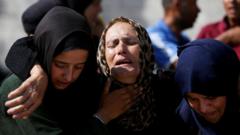Concerns mount over Iran's nuclear ambitions as war impacts reach critical levels and international dialogue remains strained.
**Nuclear Tensions Escalate as IAEA Inspectors Exit Iran Amid Ongoing Conflict**

**Nuclear Tensions Escalate as IAEA Inspectors Exit Iran Amid Ongoing Conflict**
International oversight of Iran's nuclear program halted as inspectors withdraw following a suspension of cooperation with the IAEA.
Iran's standoff with the International Atomic Energy Agency (IAEA) escalated dramatically this week as the U.N. nuclear watchdog announced that its inspectors had departed from the country just days after Iran's government halted all cooperation with the agency. Amid ongoing military tensions from Israeli strikes, President Ebrahim Raisi's administration enacted legislation that suspends oversight of its nuclear activities.
The IAEA's exit raises alarm among experts who fear that without international scrutiny, Iran may retreat underground with its contentious nuclear program, complicating future monitoring efforts. In a statement, the IAEA confirmed that an inspector team safely left Tehran, noting their presence during the recent violent conflict which involved extensive bombardment of Iranian military and nuclear facilities.
Clashes intensified after Israel targeted Iranian installations, prompting retaliatory rhetoric and military strikes. Iranian leadership has since directed frustration towards the IAEA, accusing it of undermining the nation amid escalated geopolitical tensions. Since the Israeli attacks followed the IAEA’s assertion that Iran was failing to comply with nuclear nonproliferation agreements, Iran's government contends that these statements provided justification for aggressive Israeli military action.
While the extent of damage to Iran’s nuclear infrastructure remains unclear, reactions from the U.S., including President Trump's claims of substantial destruction of its nuclear capabilities, contrast sharply with the more measured assessments offered by IAEA officials who caution that essential components of the program may be intact and unmonitored.
Despite ongoing tensions, Iranian officials have expressed a desire to reinstate dialogue, signaling a potential pivot in diplomatic efforts. Majid Takht-Ravanchi, Iran’s deputy foreign minister, emphasized to NBC News the nation’s preference for diplomatic engagement, underscoring a duality of both confrontation and openness to negotiation within Iran's evolving political landscape.
As the IAEA aims to negotiate terms for monitoring Iran's nuclear developments, Iranian officials have outlined conditions for renewed cooperation, including guarantees for the safety of their nuclear facilities and recognition of their right to uranium enrichment. The fragile state of international relations concerning Iran's nuclear program continues to foster uncertainty and calls for urgent diplomatic solutions.
The IAEA's exit raises alarm among experts who fear that without international scrutiny, Iran may retreat underground with its contentious nuclear program, complicating future monitoring efforts. In a statement, the IAEA confirmed that an inspector team safely left Tehran, noting their presence during the recent violent conflict which involved extensive bombardment of Iranian military and nuclear facilities.
Clashes intensified after Israel targeted Iranian installations, prompting retaliatory rhetoric and military strikes. Iranian leadership has since directed frustration towards the IAEA, accusing it of undermining the nation amid escalated geopolitical tensions. Since the Israeli attacks followed the IAEA’s assertion that Iran was failing to comply with nuclear nonproliferation agreements, Iran's government contends that these statements provided justification for aggressive Israeli military action.
While the extent of damage to Iran’s nuclear infrastructure remains unclear, reactions from the U.S., including President Trump's claims of substantial destruction of its nuclear capabilities, contrast sharply with the more measured assessments offered by IAEA officials who caution that essential components of the program may be intact and unmonitored.
Despite ongoing tensions, Iranian officials have expressed a desire to reinstate dialogue, signaling a potential pivot in diplomatic efforts. Majid Takht-Ravanchi, Iran’s deputy foreign minister, emphasized to NBC News the nation’s preference for diplomatic engagement, underscoring a duality of both confrontation and openness to negotiation within Iran's evolving political landscape.
As the IAEA aims to negotiate terms for monitoring Iran's nuclear developments, Iranian officials have outlined conditions for renewed cooperation, including guarantees for the safety of their nuclear facilities and recognition of their right to uranium enrichment. The fragile state of international relations concerning Iran's nuclear program continues to foster uncertainty and calls for urgent diplomatic solutions.






















